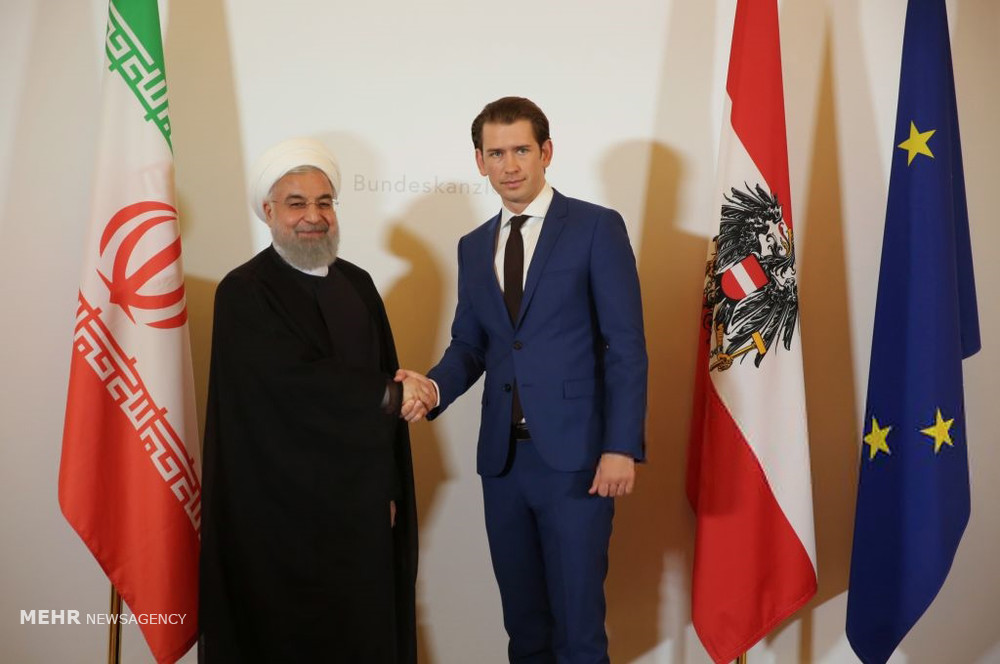Austria says U.S. sanctions violate human rights

TEHRAN – Austria and the European Union Commission believe that the United States’ sanctions go against human rights, Austrian President Alexander Van der Bellen told a joint press conference with his Iranian counterpart Hassan Rouhani in Vienna on Wednesday.
The Trump administration which has walked out of the 2015 nuclear agreement (officially called the JCPOA) has threatened to slap sanctions against European and other countries that do business with Iran.
“Austria is sorry that the U.S. has pulled out of the JCPOA and wants to reimpose sanctions which includes not only primary sanctions but secondary sanctions which affects Austria as well,” President Van der Bellen noted, IRNA reported.
He added these secondary sanctions which are “extraterritorial” violate the rights of people.
Van der Bellen criticized the Trump administration’s policy over the nuclear deal and said that the deal has never been claimed to provide answers to the entire existing problems, but to open a “window” to address them in the future.
Rouhani, for his part said, that if the remaining parties to the deal ensure Iran’s benefits, Tehran would continue to implement its part of the bargain despite the U.S. pullout.
Under the nuclear agreement signed in Vienna on July 14, 2015 Iran is obliged to put limits on its nuclear activities in exchange for termination of nuclear- related economic and financial sanctions.
“The decision made by America is in nobody’s interest. It is among the decisions that a government makes against the national interest of its own and others,” Rouhani noted.
He also said that during his meeting with his Austrian counterpart the two sides discussed security issues in West Asia, including Iran’s consistent role in fighting terrorism as well as the destructive roles of the U.S. and Israel in the region.
Talking in the joint meeting of senior officials from Iran and Austria, Rouhani also said Tehran “welcomes further development of ties” with Vienna. He also said Tehran will not allow the U.S. wrong policies to affect Iran’s ties with the outside world.
The Iranian president also called on Europe and the larger world to resist the United States’ unilateralism.
Rouhani also said Iran’s war against terrorists has benefitted the region and the world at large.
Rouhani calls his talks with Austrian chancellor ‘very useful’
Rouhani also described his talks with Austrian Chancellor Sebastian Kurz “very useful”, saying they exchanged views on bilateral relationship, the JCPOA, and regional issues.
Talking in a joint press conference with Kurz, Rouhani said Iran and Austria are firm to develop their ties in areas of economy, trade, science, culture and tourism.
Rouhani said the two sides agreed to work out plans for financial and banking transactions so that the impending U.S. sanctions would not affect the two countries’ ties.
The president also said the Iranian side told the Austrian officials that Iran will remain in the nuclear deal so long as its “interests” are protected.
Rouhani said the entire world is “aware about the positive effects of preserving the JCPOA” and also about the “negative consequences” of killing it and the “Iranian nation choose their path based on their interests.”
Chancellor Kurz: Austria, EU are committed to JCPOA
Chancellor Kurz also told reporters that Austria-Iran ties in different areas are in a “favorable” condition and “rising”. He said the two countries have maintained a continuous political, economic and cultural ties for about 160 years and still the two sides make joint efforts to develop it.
Kurz added that Austria as an impartial state is considered a venue for international negotiations and he is happy that Vienna hosted the nuclear talks between Iran and its negotiating partners and that they bore fruit in 2016.
He added, “Austria and the European Union are committed to the JCPOA.”
The chancellor also expressed hope that dialogue between foreign ministers from countries signatory to the JCPOA who will meet in Vienna on Friday would lead to “positive results” now that the U.S. has quitted the agreement.
Before the two presidents’ meeting, Kurz in a tweet voiced support for the JCPOA.
It is highly important that the EU stays committed to the deal and it is necessary that all other parties also abide by it, he wrote.
Austria, Iran agree to cooperate on renewable energy, water management
Also on Wednesday Iran, Austria signed four cooperation document on water resources management, renewable energy, transport, and mining.
The documents were signed at the presence of the Iranian and Austrian presidents.
SP/PA
Leave a Comment